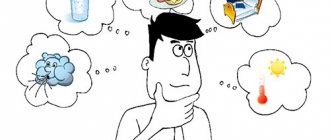Each inhabitant of our vast planet has its own basic needs, even the simplest ones - single-celled ones. If all the needs experienced are not met, the creature will not be able to function normally, feel comfort and enjoy life. Humanity has a significant number of requests that must be fulfilled in a timely manner in order to continue to live. In this article I will talk in detail about the physiological needs of a person and give a detailed definition of what they are.
What are physiological needs
Human physiological needs are the most important driver of behavior for both individuals and entire nations. We know from history how, fleeing hunger, tribes on barren lands went to war against their neighbors, recapturing their fields and livestock. The thirst of those lost in the desert could push them to kill if another person stood between them and the water. Therefore, no one will argue about the importance of these human needs. However, fortunately, people do not live only by them. Otherwise, absolutely nothing would distinguish us from animals living by instincts. What, besides food and water, does a person need? Let's look below.
What needs does a person have besides physiological? Maslow's pyramid
This concept is interpreted differently in many branches of science. The famous American psychologist A. Maslow even created the so-called “pyramid of needs”. This is a unique model of human motivation. This pyramid has gained enormous popularity; it was literally taken brick by brick by marketers, psychologists and psychiatrists, advertising creators and management luminaries. However, the professor himself never used it to explain his theories. He considered the physiological needs of a person to be leading only when they were pathologically dissatisfied. Simply put, food becomes the main thing for a person during its (possibly long) absence. If the individual is full, then that need gives way to higher and more valuable ones.
At the heart of the diagram we see human physiological needs, such as hunger and thirst, as well as key sexual instincts (or libidinal, as the great Freud called them).
Safety comes second. The concept is somewhat vague, it includes the well-known concept of comfort, coziness, stability of the habitat (home), protection from external factors and possible enemies. And only in third place are social needs, that is, a person will think about their satisfaction after satiation and being in comfort. That is, the physiological need is key. After social ones (communication, care, general affairs), the fourth level of the diagram depicts the so-called “prestigious”, or needs for prestige, that is, for respect and self-esteem (whether these concepts are related or not, we’ll let psychologists figure it out). The crown of the pyramid is spiritual needs.
What other needs are there besides biological?
The creator of the pyramid of values, A. Maslow, considered the physiological need to be leading in something. This unique table in the form of a triangle gained great popularity, and psychologists, marketers, advertising specialists and management professionals immediately began to use it in their activities.
The basis of the pyramid is made up of biological needs, which I listed in detail above, the second step is occupied by the need for security (the presence of comfort, coziness, stable work). At the third level there are social values (communication, being in the spotlight). The fourth stage consists of prestigious needs - respect, recognition, self-sufficiency and independence. And the last level is spiritual values (art, creativity).
Why do you need to satisfy physiological needs?
Satisfaction of needs according to Maslow comes from the bottom up. That is, only with the most complete satisfaction of the lower level is a transition to the highest possible. The spiritual and social development of a person is important, but in the grip of hunger he simply will not have time for them. These schemes were used by tyrants and generals in ancient powers even before our era. Hungry people are easier to manage than well-fed people. The unsatisfied physiological needs of the human body prevented him from thinking, much less striving for freedom or independence. Fortunately, tyranny and the slave system have been almost eradicated today, but marketers and creators (creators of advertising) have taken possession of the truly magical secret pyramid. They construct their texts by appealing to the lower instincts of man.
Scientific theories about human needs
The concept of needs has many classifications. In psychology, these are known as need theories. At the same time, it is possible that you may call some of the theories strange and illogical. But everything that we indicate in the article is the basis of the theory of psychology. We suggest that you do not waste time on biased criticism and consider in detail each of the available theories. Most likely, you are already familiar with them, at least superficially.
Maslow's pyramid is one of the most famous theories
Maslow's pyramid is embedded in almost every branch of knowledge. It is studied in the basis of psychology, medicine and law. What is the generally accepted Maslow pyramid?
We invite you to figure it out together:
- The author of the theory is researcher Abraham Maslow, after whom the pyramid of the same name is named.
- According to the theory, human needs are divided into primary and secondary.
- According to Maslow's pyramid, a person acts based on the satisfaction of needs, which are arranged in a certain hierarchical sequence. They are the basis for man.
Physiological needs of the child
Why are we given physiological needs? The answer is simple - for survival. Without these needs, we simply would not be able to survive and live. A person is already born with these needs. This can be seen especially clearly in the example of newborns. Eating for a baby is usually caused by a demanding loud cry. And this is understandable, the child cannot say or demand what is necessary in any other way. The baby’s key needs are food, maternal warmth (which replaces several needs of our pyramid at once: safety and social contact), good sleep and normal well-being. When these needs of the child are met, we will get a calm, smiling child who wants to play and see something interesting; when dissatisfied - a continuously screaming and crying lump, reminiscent of a wounded animal.
Hierarchy of values
Abraham Maslow, the creator of the pyramid of needs (you will learn about it in detail by clicking here), believed that all of the above needs are leading only at the moment when their dissatisfaction is felt. The rest of the time, the individual is more concerned about material and spiritual values.
For example, do you think about how you breathe? Just like that, solving work issues and doing everyday things? Do you pay attention to this vital process until difficulties arise that prevent you from inhaling and exhaling? If you don’t meditate, or don’t try to perform techniques to calm yourself, then it’s unlikely. As long as there is no lack of oxygen, attention will be focused on other tasks.
Physiological needs of an adult
The needs of an adult repeat the needs of a child in everything, only one more particularly important instinct is added to them - reproduction (sexual, libidinal). This “basic instinct,” if dissatisfied, can turn a person into a real aggressor. With adequate hormonal background, of course. Nowadays, due to environmental pollution, poor nutrition and other factors, this need is muted for many. However, there are also people for whom it exceeds other needs, which pushes them to crime. Fortunately, there are only a few of them, and they most likely have a history of psychiatric pathologies.
As for healthy people, where this physiological need is in its rightful place, it is worth saying that it is wrong to both underestimate its importance and exaggerate it. The latter is characteristic of cinema and pop stars, who appeal with their appearance and creativity to this ancient instinct. A healthy, appropriate attitude is very important here. Intimate relationships are important for a person, but this does not mean that you need to indulge in them at every opportunity. The ideal option is marriage or a stable relationship with a loved one.
Food. How to prevent a need from becoming an addiction
Hunger and thirst, as we said above, were even the cause of wars and the nomadic life of our ancient ancestors. Fortunately, in civilized countries the concept of famine is familiar only from history textbooks. In popular culture, the other extreme is promoted - constant weight loss, pills to reduce appetite, health-improving fasting have become fashionable and popular things. But people who are led by advertising are often not aware that fighting the cornerstones laid down by nature is fraught with consequences for both physical and psychological health. Against the backdrop of the mass pursuit of the ideal body, clinical cases of bulimia (a mental or physiological disorder characterized by a constant desire to eat) and anorexia (refusal of food due to psychological personality disorders) are increasingly emerging. It is worth remembering that an unsatisfied need in the body can become addiction and mania.
Substitution
Biological needs, although they are very different in meaning and significance from the others, cannot be considered as separate. They are closely related to the desire to receive love, recognition, to show their independence, etc. Remember those same babies who require the breast, sometimes just to feel the closeness of their mother, to experience the reassurance that they are safe.
Have you heard about mental illnesses such as bulimia and anorexia? Modern society promotes the need to have an ideal body, which is why various weight loss products are actively and aggressively advertised everywhere. Sometimes success and intellectual abilities equal a beautiful appearance. This makes itself felt by the formed false stereotype. That only in excellent physical shape and a well-ironed suit can a person generate brilliant ideas and manage people.
So, when, thanks to diets, the digestion process is disrupted, if only because food rarely enters the body, disturbances also occur in a person’s ability to recognize the feeling of hunger. At times of stress, some people refuse food, some, on the contrary, abuse it in order to be distracted and switch. They try to “sweeten” their life with baking. Use large volumes to fill the feeling of “inner emptiness.”
The relationship with food may well develop into addiction, when it is difficult to control and limit yourself. Especially in moments of increased anxiety, restlessness, and dissatisfaction. This is why it is so important to be attentive to yourself and eat when you really feel hungry. And not just a desire to experience joy or calm down.
Healthy sleep as the most important need
Sleep is on a par with the needs for food and water, satisfaction of the sexual instinct and breathing. However, many downplay its importance, which is done in vain. The example of Napoleon, who slept several hours a day, will fade if we remember the unstable psyche and panic attacks of this historical character. Do you want to experience these “joys” for yourself? Hardly. Lack of sleep deprives us of psychological comfort, lowers the pain threshold (makes us more sensitive to pain), and negatively affects performance. An unsatisfied physiological need for sleep can even lead to visual and auditory hallucinations. Moreover, a sleep-deprived person working with machinery or transport can be deadly to those around him during the microsleep phase (a phenomenon when a person’s brain, which has not known rest or sleep for a long time, “turns off” for a split second).
Explanation of concepts
Biological needs are the most significant and valuable, as they ensure life. Even a slight denial of satisfaction can lead to negative consequences (illness, organ system disorders, weakness, death).
A need is a request that must be immediately fulfilled in order for the individual to feel good:
- felt protected;
- was important to others;
- functioned normally without any disruptions to the body;
- achieved goals and made dreams come true;
- felt satisfied.
Human physical needs are a type of need, failure to fulfill which leads to loss of life. If a person cannot support them, he will lose the opportunity to achieve goals, and if they are not satisfied at all, diseases and dysfunctions of the body will appear, which will lead to unnamed death (this does not apply to the desire for procreation).
Examples of biological queries:
- eating high-calorie foods for energy and sustenance;
- rest and sleep;
- air;
- liquid;
- desires of a sexual nature and procreation.
They are the lowest needs. They are required to be performed not only by human beings, but also by representatives of the entire animal world, even insects. However, in the simplest organisms this list is not so large.









